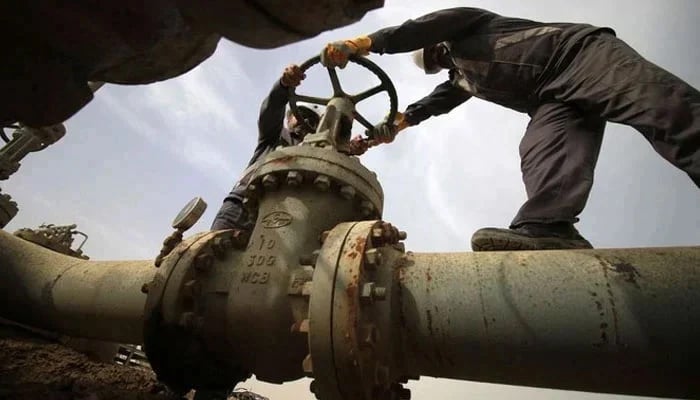Govt evolves energy plan amidst depleting local gas reserves
ISLAMABAD: The government is developing a comprehensive energy plan that includes the management of the country’s gas reserves, imports of Liquefied Natural Gas (LNG) and LPG, along with gas pipeline projects and infrastructure.
A senior government official shared this information with a parliamentary committee on Friday, emphasizing the need to address depleting local gas reserves and meet domestic demands economically.
Secretary of the Ministry for Energy (Petroleum Division), Mohsin Agha, while briefing the Senate’s Standing Committee on Petroleum, said that this comprehensive plan is under development and will be presented to parliament for consideration.
The committee met here with Senator Mohammad Abdul Qadir in the chair. Regarding the energy sector, the secretary mentioned that the Special Investment Facilitation Council (SIFC) has initiated efforts to enhance LPG storage. The focus is on increasing the storage volume at the Karachi Port from the current 13,000 metric tons to 25,000 metric tons, with work already underway.
In response to the diminishing local natural gas reserves, Agha informed that piped gas supplies would decrease in the coming months and years. As a result, households will predominantly rely on Liquefied Petroleum Gas. The government, he added, has granted concessions on the import of LPG.
Interestingly, the Oil and Gas Regulatory Authority (Ogra) faced challenges in controlling the escalating prices of LPG in the local market. The Ogra chairman conceded that there was no uniform pricing for LPG across the country. While Ogra set the price at Rs3,007/11.8kg cylinder for the current month, the product is being sold at Rs3,200/cylinder in different regions.
It was noted that foreign companies did not participate in the auction of local oil and gas exploration blocks. The OGDCL official informed the committee that by 2027, work on various gas blocks would be completed, with 2-D and 3-D studies already concluded for 21 gas blocks. Highlighting concerns about LNG imports, Abdul Qadir noted that since 2015, the ministry has been purchasing LNG, limited to 2-3 bidders who determine the price, despite numerous bidders worldwide. Allowing private entities could make the price more competitive. He also highlighted that several government and private companies are non-operative due to minor disputes, suggesting that the ministry should resolve petty matters to achieve positive collective results.
The committee members discussed the suspension of gas supply in industrial units in the province of Sindh for two days a week, causing a production loss of 28 percent, as well as a delay in the completion of orders/supply.
Officials from the Ministry for Energy (Petroleum Division) reported an annual depletion of over 10 percent in gas reserves, with current SSGC (Sui Southern Gas Limited) supplies down by 90 MMCFD compared to the previous year.
Ministry Secretary Mohsin Agha emphasized the sustained decline over the past 8 to 10 years, urging a comprehensive plan for policymaking. The committee analyzed supply statistics and gas depletion, recommending the Ministry for Energy (Petroleum Division) to address discrepancies for conclusive results.
Senator Saadia Abbasi attributed the rise in cylinder prices to taxes, while Chairman Mohammad Abdul Qadir suggested exploring gas transportation via seaports and large ships to mitigate costs.
The OGRA chairman noted the existing FBR mechanisms at sea borders but acknowledged the current impracticalities of large ships, with ongoing efforts to enhance LPG operations at the Karachi Port.
-
 Prince Harry And Meghan Unlikely To Meet Royals In Jordan
Prince Harry And Meghan Unlikely To Meet Royals In Jordan -
 Hero Fiennes Tiffin Shares Life-changing Advice He Received From Henry Cavill
Hero Fiennes Tiffin Shares Life-changing Advice He Received From Henry Cavill -
 Savannah Guthrie's Fans Receive Disappointing News
Savannah Guthrie's Fans Receive Disappointing News -
 Prince William Steps Out For First Solo Outing After Andrew's Arrest
Prince William Steps Out For First Solo Outing After Andrew's Arrest -
 Jake Paul Chooses Silence As Van Damme Once Again Challenges Him To Fight
Jake Paul Chooses Silence As Van Damme Once Again Challenges Him To Fight -
 Google Disrupts Chinese-linked Hacking Groups Behind Global Cyber Attacks
Google Disrupts Chinese-linked Hacking Groups Behind Global Cyber Attacks -
 Four People Killed In Stabbing Rampage At Washington Home
Four People Killed In Stabbing Rampage At Washington Home -
 Meghan Pushes Prince Harry Into Territory That’s Dangerous To His Brand: ‘She Isn’t Hearing A Word Of It’
Meghan Pushes Prince Harry Into Territory That’s Dangerous To His Brand: ‘She Isn’t Hearing A Word Of It’ -
 Christina Applegate Reflects On Lasting Impact Of Being Molested In Childhood
Christina Applegate Reflects On Lasting Impact Of Being Molested In Childhood -
 Martin Short Makes Big Decision Following Tragic Death Of Daughter
Martin Short Makes Big Decision Following Tragic Death Of Daughter -
 Antarctica’s Mysterious ‘gravity Hole’: What’s Behind The Evolution Of Earth’s Deep Interior?
Antarctica’s Mysterious ‘gravity Hole’: What’s Behind The Evolution Of Earth’s Deep Interior? -
 Hilary Duff Addresses Ashley Tisdale's 'toxic Mom Group' Claims And Matthew Koma's Firey Response
Hilary Duff Addresses Ashley Tisdale's 'toxic Mom Group' Claims And Matthew Koma's Firey Response -
 Jack Hughes's Proximity To Trump Angers Tate McRae Fans
Jack Hughes's Proximity To Trump Angers Tate McRae Fans -
 Neve Campbell Opens Up About Her 'difficult Decision' To Not Sign 'Scream 6'
Neve Campbell Opens Up About Her 'difficult Decision' To Not Sign 'Scream 6' -
 Nobel-winning Scientist Resigns From Columbia University After Epstein Links Revealed
Nobel-winning Scientist Resigns From Columbia University After Epstein Links Revealed -
 Prince William Remarks At BAFTAs 'indicative' Of King Charles Physical, Mental Health Too
Prince William Remarks At BAFTAs 'indicative' Of King Charles Physical, Mental Health Too




